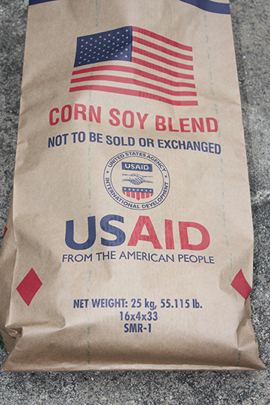Senators oppose Obama proposal to eliminate food aid funding
February 20, 2013 | 06:44 PM

 Sen. Mark Pryor, D-Ark., and Sen. Roy Blunt, R-Mo.
Sen. Mark Pryor, D-Ark., and Sen. Roy Blunt, R-Mo.Amidst rumors that the Obama administration’s draft budget for fiscal year 2014 would eliminate the food aid programs that provide U.S. commodities in low-income countries and replace them with a smaller program to provide money to buy commodities on the international markets, 21 senators are urging President Barack Obama to maintain funding for the Food for Peace program.
The group is led by Senate Agriculture Appropriations Subcommittee Chairman Mark Pryor, D-Ark., and ranking member Roy Blunt, R-Mo., Senate Agriculture Committee Chairman Debbie Stabenow, R-Mich., and Senate Agriculture ranking member Thad Cochran, R-Miss.
“We write to request that you maintain funding for the U.S. Department of Agriculture Food for Peace Program, also known as Public Law 480, in your fiscal year 2014 budget request to Congress,” the senators wrote Obama.
“As you know, Title II of Public Law 480 provides for the donation of U.S. agricultural commodities by the U.S. government to meet humanitarian food needs in foreign countries. We are supportive of USDA’s work in this area.”
Noting that “Food for Peace has been our nation’s flagship international food assistance program since its establishment in 1954,” the senators also pointed out that when President Dwight Eisenhower signed the law authorizing the program he said its purpose was to “lay the basis for a permanent expansion of our exports of agricultural products with lasting benefits to ourselves and peoples of other lands.”
“Food for Peace provides economic benefits at home, stimulating our farm and transportation industries,” the senators wrote.
“American agriculture is one of the few U.S. business sectors to produce a trade surplus, exporting $108 billion in farm goods in 2010. During this time of economic distress, we should maintain support for the areas of our economy that are growing,” the letter said.
“In addition to providing American commodities directly to those without access to food, Food for Peace supports a variety of developmental programs implemented by U.S. faith-based organizations, designed to help end the cycle of poverty.”
The budget for P.L. 480 is approximately $1.5 billion for fiscal 2013 from appropriations and transportation reimbursement funds, and Food for Progress is approximately $170 million for the fiscal year, from Commodity Credit Corporation funds.
Together they provide 1.6 million metric tons of commodities. Shifting to international procurement could mean a significant drop in U.S. government purchases of American commodities.”
The draft Obama proposal reflects a long-term battle between the traditional providers of food aid and development advocates. The traditional providers — American farmers, shipping companies and the humanitarian groups that deliver the food aid — say that Food for Peace and Food for Progress are successful programs with strong political constituencies that have provided needed food all over the world since the 1950s.
The development advocates argue that shipping commodities from the United States to poor countries is an inefficient and outdated system that provides too much benefit to U.S. producers and shippers.
The conflict also reflects differences between the Agriculture Department, whose professionals tend to favor the commodity program, and the U.S. Agency for Development, whose staff favors cash aid.
One food and development lobbyist who is sympathetic to the development argument said that the issue is whether Congress would maintain cash assistance or shift the budget authority to other purposes. The Agriculture appropriations subcommittees through which the money flows have supported the program, but if the program is shifted to cash it would apparently flow through the Foreign Operations subcommittees, which have different priorities.
Another lobbyist noted that the farmers, shippers and humanitarian groups have been a reliable constituency for food aid, but that no similarly strong constituency exists for cash food aid.
“Money may be easier to move around the world but it would not withstand the budget ax of a future Congress and Administration,” the lobbyist said, The goal of the letter from the senators, he added, is to reverse the proposal before the budget is released.
The Alliance for Global Food Security, which is made up mostly of U.S. food aid groups that distribute the commodities and use money from the sale of them in needy countries— a process called monetization — for development projects urged the senators to sign the letter. The Government Accountability Office has been critical of monetization, saying that it is an efficient way to raise money for development projects.
Members of the alliance:
- Adventist Development & Relief Agency International
- ACDI/VOCA
- Congressional Hunger Center
Counterpart International - Food for the Hungry
- Joint Aid Management
- International Relief & Development
- Land O’Lakes
- OIC International
- Planet Aid
- PCI
- Salesian Missions
- United Methodist Committee on Relief
- World Vision

“We are very concerned that these drastic budget proposals will eliminate an important component of our nation’s diplomacy, development and national security toolbox. We are also dismayed that there were no consultations with stakeholders about the potential ramifications of these proposed changes. NGOs implement these program in the field, working directly with recipients. Organizations that conduct these programs are constantly reviewing and improving methodologies based on lessons learned. Thus, food aid programs are better than ever and these proposals are unwarranted.”
The alliance also said the proposal “would likely be paired with a recommended increase in support for U.S.-flag vessels through the military’s Transportation Command in order to address concerns that reducing the flow of cargoes on U.S. ships will result in a loss of merchant marine vessels that could be used for military needs.”
The senators’ letter does not mention Food for Progress, another program that includes technical assistance to improve systems, and, according to rumor, would also be cut, but one lobbyist said that was not included because the food aid advocates did not know that it was going to be cut at the time the letter was developed.
“Food for Progress has developed successful models for cocoa, dairy, poultry, coffee and other value-added food systems in developing countries – improving food quality and supplies, increasing incomes and stimulating broader economic growth,” the alliance wrote the senators.
But they made their strongest case for food aid.
“Changing Food for Peace to an overseas procurement program, cutting its funding and overriding carefully-proscribed procedures in current statute would impede the ability of the U.S. to meet the needs of the hungry,” they wrote.
“It will destroy the U.S. food aid pipeline, which is a reliable source of wholesome foods and commodities. Moreover, it will eliminate an important component of our nation’s diplomacy, development and security toolbox.”